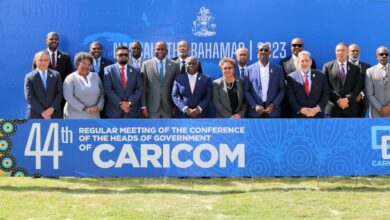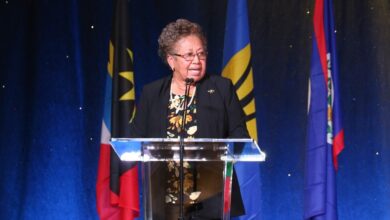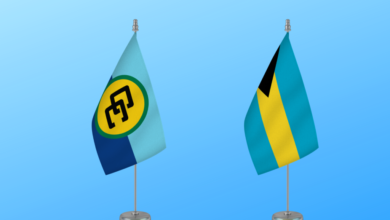Fellow Colleagues:
- CARICOM Secretary General Dr Carla Barnett,
- Outgoing Chairman the Hon John Briceno and
- Incoming Chairman HE Chandrikapersad Santokhi,
- United Nations Secretary General António Guterres,
- and Fellow Heads of Government:
As one of the newer Heads of Government in the region, I have been grateful for the opportunities during the first nine months of my administration that allowed me to connect and reconnect with friends and colleagues from around the region.
It is a pleasure to welcome the newly-elected leaders from Saint Lucia, the Hon Philip Pierre, and Grenada, the Hon Dickon Mitchell, as well.
Each one of us faces the extraordinary challenges associated with these times. These occasions to meet and work together are a gift, and I know many of you share my determination to make the most of the opportunities they represent.
Colleagues, the Commonwealth of The Bahamas gained full independence in 1973, the same year that the Caribbean Community and Common Market were founded.
It is providential that in 2023, in The Bahamas we will observe our 50th Anniversary Celebrations, and in the days leading up to the observance, we will hand over the Chair of CARICOM.
This is an opportune juncture to remind ourselves of the many ways our community of 5 friends and partners are bound together; our connection only begins with shared geography. Like any family, our members do not always see eye to eye, but our interwoven histories, traditions, and relationships provide a foundation for meaningful deliberation, collaboration, and innovation.
Forty-nine years ago, we were focused on the potential opportunities of regional integration. Today, we find ourselves focused on confronting shared challenges, including
The economic constraints and vulnerabilities inherent to Small Island Developing States;
• The ongoing COVID pandemic, which includes new variants, depleted health care systems, long-term health impacts, and the need to strengthen prevention, surveillance and treatment;
• a global inflation crisis, which leaves many of our people struggling to afford food, energy, and housing costs;
• social security systems stretched to the maximum as we seek to provide safety nets; and of course,
• the existential threat posed by climate change.
It is striking that so many of our most urgent struggles derive in great part from external causes. We are each responsible for making our individual countries stronger and more resilient to the impact of external events. But the history of our region makes clear that we can have a greater impact if we also join forces and stand together.
The Bahamas is one of the ten countries in the world most vulnerable to climate change. 8 While every country in the world is facing adverse and extreme weather events, the countries in our region face extraordinary and immediate risk. We have heard — for many, many years — about the good intentions of others. I know you join me in seeing the urgency of moving beyond promises and pledges. It’s time for action.
Fortunately, there is hope on the horizon. Due to our joint and persistent advocacy, work is now underway in the global community on the development of a multidimensional 9 vulnerability index that will better measure our development needs and improve access to development assistance. Once completed, it will replace inadequate tools such as per capita GDP.
I invite you to attend the UNFCCC Regional Heads of Governments Meeting in The Bahamas next month, August 16th -18th , to discuss matters pertaining to Climate Financing and Adaptation ahead of COP 27.
The Caribbean as a region will need more 10 than $40 billion to finance adaptation efforts and disaster recovery.
Over the last few years, many of our countries have not fared well. Small ocean economies gain in negotiating strength and influence when we work effectively as one. It is no exaggeration to say that, if we do not stand together, we – each one of us — in danger of falling apart. The deadline to attain the 2030 Sustainable Development Goals agenda is a mere 8 years away. Many of us 11 are lagging in critical areas. There is no time to waste.
So, what is standing in our way? What prevents us from moving closer to the ideals and aspirations of those who sat around the table 49 years ago before us, and dreamt of better futures for us all?
Friends, while the world’s problems do wash up on our shores, sometimes we contribute to standing in the way of our own progress.
We find it too easy to walk away from settled agreements, to pursue the course which we think will help our narrow, national interest. Too many times, our countries have acquiesced to the pressures of larger, more developed states. Their approach of divide and conquer has hurt us all. Might we be deriving greater value from our tourism industries if we had continued to negotiate in concert with some of the large multi-national corporations? And might we have fared better during the COVID-19 pandemic if we had 13 acted together to secure vaccines and medicines?
Just weeks ago, we lost a giant: the Barbadian writer George Lamming. He unflinchingly chronicled the legacy of colonialism and was a fierce believer in regional unity.
In 1966, he wrote: “The architecture of our future is not only unfinished; the scaffolding has hardly gone up.”
If we are honest, too little has been built since 1966. We can do so much more – it’s never too late to make progress in earnest. The scaffolding for our regional architecture – the scaffolding for our future — is in our hands.
When I addressed the UN General Assembly last September, I made the point that “You will only be safe when we are all safe!”. I reiterate this today with respect to our mutual destinies. And I note that we have important leadership in our CARICOM Secretariat, headed by a female for the first time in our 15 history. Under the effective leadership of Secretary-General Barnett, let us harness the expertise of our Secretariat to move forward together.
With our vision restored, and our courage firmly bound, we in this region can achieve great things.
We can lift our people out of poverty! We can facilitate the generation of wealth and opportunity! And most of all, we can ensure our survival long into the future!
My Friends:
Most of us are descended from people who were forced to cross the ocean at the bottom of a boat. Chained, malnourished, and oppressed, they were able to do more than survive the brutality of their forced labour — they and the generations that followed built the foundations of our island nations.
Surely then, we can find the strength and courage to work together to face the challenges of our time.
The national anthem of Suriname reminds us that “wherever our ancestors came from, we should take care of our country”. With great respect, I will add: wherever our ancestors came from, we should take care of our countries and our region.
We can find the determination and renewed purpose to leave behind something better for those who will follow us. I certainly believe we can! We will be better together.
Thank you.
END






